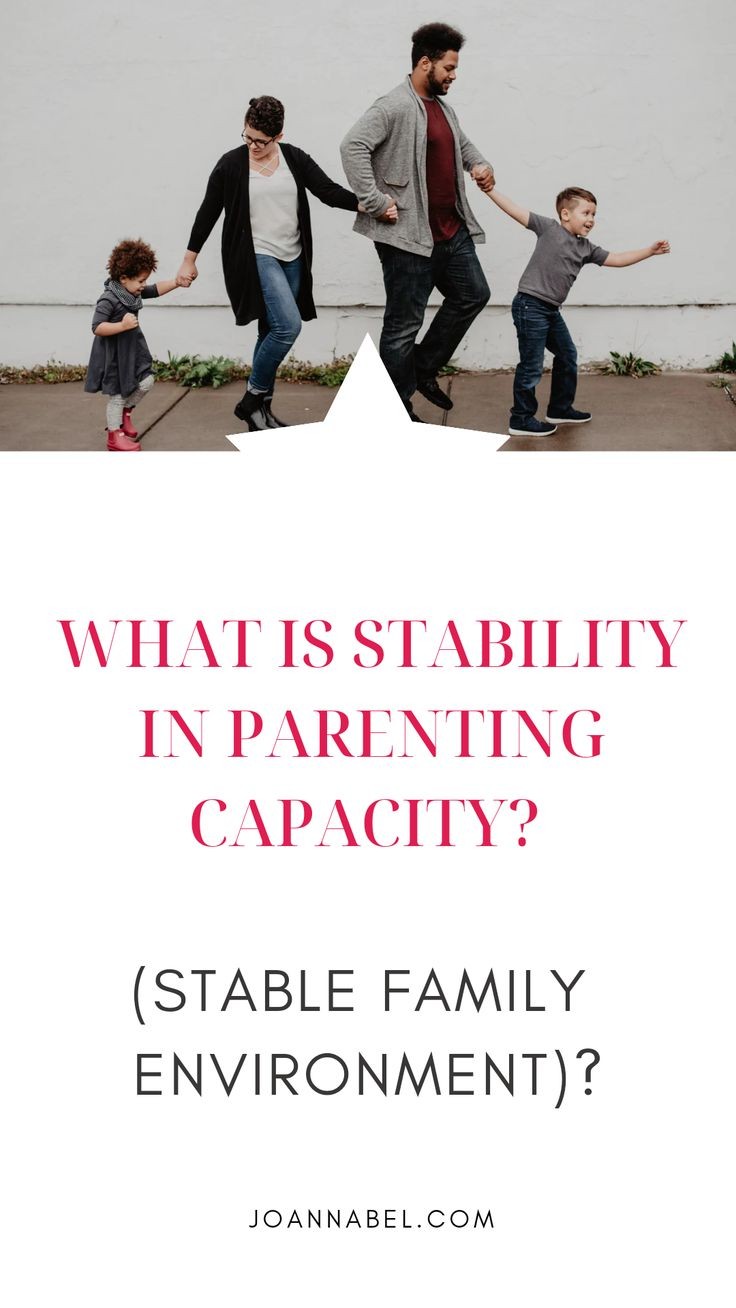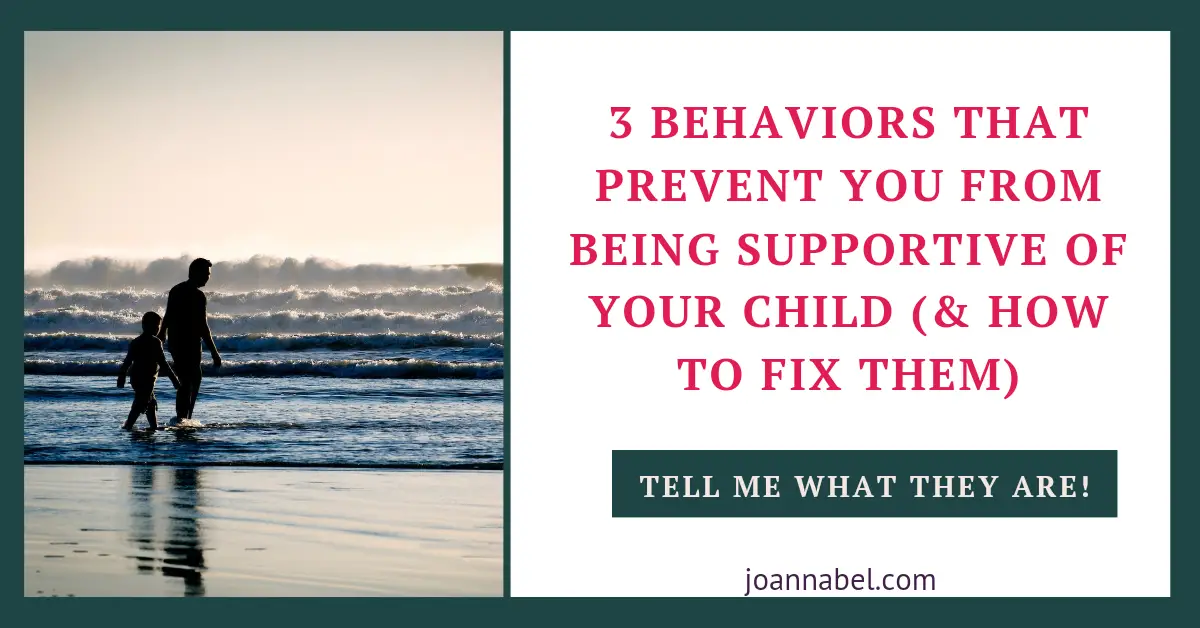If you want to know more about stability in parenting capacity, this post will provide essential information on it.

What Is Stability In Parenting Capacity (Stable Family Environment)?
Stability in parenting capacity relates to capability to ensure that family environment is stable enough to support secure attachment with a child’s parent or other caretaker that’s uninterrupted, consistent, and responsive to the child’s need for stable emotional connection and trusting relationship. The need for stability of the relationships expands to other close family members and other people who are considered important in child’s life.
In this post we’ll cover what stability in parenting capacity is, why it’s important for a child and family, as well as what you should keep in mind as vitally significant for this particular domain of parenting capacity.
Before we talk more about stability, we need to mention what parenting capacity is in the first place, what isn’t, why personal preference, values, and expectations on how should parents behave aren’t a criteria for “good” parenting, and what can obstruct or weaken parenting capacity.
I’ll also mention what’s needed to make a change when it’s obvious that a change is needed.
Let’s get to it!
Note: Although I am a Clinical Social Worker, engaging with this website does not establish a professional social worker-client relationship. The information provided here is for general purposes only and should not be considered professional advice. While we strive to ensure accuracy and reliability, this content is not a substitute for professional guidance. For specific concerns, issues, or situations, it is essential to consult a qualified professional and present your situation. Read the full Disclaimer here.
HOW WE DEFINE PARENTING CAPACITY
Parenting capacity refers to parents’ capability to recognize the child’s needs, give them a priority, and respond to them suitably so they can provide protection, care, and necessary conditions for a child to grow and develop.
These necessary conditions need to fit the child’s age. This means they need to be adapted to the child’s developmental needs and evolving capacities. And have to match the phase in the child’s development.
To know more about how or how well parents respond to the child’s needs, we need to undertake a parenting capacity assessment. And parenting capacity has several dimensions. They are:
- ensuring safety,
- basic care,
- emotional warmth and responsiveness
- guidance and boundaries,
- stability, and
- stimulation.
To be able to become clear about the parenting capacity of a parent, we need to put effort into understanding more about these 6 dimensions with each parent.
For more details concerning parenting capacity, read my blog post that covers it in much more detail. Here is the link: What Is Parenting Capacity And How To Find Balance As A Parent?.
WHAT PARENTING CAPACITY IS NOT
Parenting capacity IS NOT:
- static or inflexible,
- to be reduced just to some psychological factors of parenting,
- just about psychological processes,
- necessarily reflected in the child-parent relationship,
- determined by the child-parent interaction,
- to be seen as the individual skills and capacities of a parent that are fixed or even innate.
If you’re under these impressions, that’s likely due to common misconceptions about individual characteristics being all that influence one’s well-being. And it can happen that you’re not (fully) aware of these beliefs.
That’s depending on the conditions and circumstances a family encounters in the family life cycle.
This means there is a constant exchange between the family and the social environment. A family is a part of society, whose values and culture are reflected in the family.
Individual characteristics of a parent and of a child matter a lot, but there’s much more to it than psychological traits, psychological processes, and individual attributes.
What I also need to say here is that the criteria for good parenting capacity, or good parenting in general, are not to be defined by our personal values and aspirations. Since we all have so many of them.
This means we shouldn’t confuse good parenting with our personal beliefs, aspirations, and (sometimes/often too high) criteria.
Again, much more about parenting capacity and the 6 dimensions of parenting capacity, you can read in my blog post that covers that in detail. Here is the link to access it: What Is Parenting Capacity And How To Find Balance As A Parent?.
Next, we need to mention factors that affect parenting capacity. Because this creates a lot of confusion and there are many misconceptions concerning this.
WHAT FACTORS AFFECT PARENTING CAPACITY?
Factors that affect parenting capacity are circumstances that can potentially obstruct parenting capacity or parenting competence. Their existence in family dynamics creates confusion and fear in terms of outcomes on the child’s functioning.
They are physical disability, mental illness of a parent, intellectual disability, psychoactive substance abuse, criminal behavior or lifestyle, violence between intimate partners (domestic violence), family conflicts, parent’s trauma, and socioeconomic conditions.
When I say they have the potential to limit parenting capacity, this means that children can be at risk, and even have their well-being or life endangered.
Still, the fact is that children living in families impacted by these circumstances aren’t necessarily at risk of long-term negative outcomes.
And we need to be very attentive to common stereotypical perspectives and prejudices about these families and those kids.
The right way is to more than anything focus on strengths. To observe things from the perspective of strengths. Or we’ll contribute to these families facing (more) stigma and even marginalization.
So it’s not about having a problem or a condition, it’s about if and how this influences competence.
And if it does in some way, we put effort to understand what parts of capacity we’ve got preserved, what are factors of protection vs. the factor of risks, what are the available support systems or resources, etc.
Simply being affected by these circumstances DOES NOT mean we have weakened or limited parenting capacity.
You may want to check out also:
Now, let’s talk about stability as a parenting capacity dimension.
WHAT STABILITY IN PARENTING CAPACITY IS
Stability in parenting capacity relates to capability to ensure that family environment is stable enough to support secure attachment with a child’s parent or other caretaker that’s uninterrupted, consistent, and responsive to the child’s need for stable emotional connection and trusting relationship. The need for stability of the relationships expands to other close family members and other people who are considered important in child’s life.
This parenting capacity dimension is something we all can easily relate to. And it’s because every human being seeks it their whole life.
They are never fully at peace if they don’t have it. Whatever else they gain in life.
It’s the certainty of the relationship and the family environment. Where all the important persons we are attached to are available to us and there is continuity of relations.
We need it to be a space of predictability, consistency, and trust. Whatever is happening at particular moments or situations.
And when bad things happen we need this even more.
It should be a space of freedom and clear limitation at the same time.
A place where you’re encouraged to be independent and build your identity and individuality.
With routine and structure but with emotional warmth and connections at the same time. And it should be consistent and predictable for the child in similar situations.
It needs to be a place with clear roles and positions. A parent is a parent, and a child is a child (roles are suitable). And they both accept this and stick to it. Yes, it sounds so basic, but it’s not sometimes.
And if parents are separated, the child needs to see and talk to the other parent who now lives apart too. Except there is an OBJECTIVE safety risk of course. And the child’s important relatives and close people.
The intimate partnership of the parents is not to be equated or confused with parenting capacity and parenting skills. (This means that your perspective of your (ex) partner as a romantic partner shouldn’t be confused with the perspective of them as parents, or how they respond to the child’s needs.)
And the same thing applies when the child gets separated from her or his biological family. The need for stability and permanence is even more important.
And when parents face circumstances that impede or prevent the functioning of some of these aspects, they and their children should be provided with support from relevant social institutions or organizations.
These conditions can be a consequence of a big social change or disaster. As well as a change or difficulty in family structure or environment.
It’s not just about if there is a stable environment, it’s about the potential for it, if circumstances that affect the family do not support the stability at the moment.
So it’s not just about spotting the problem, it’s about assessing the potential for positive change.
And assesment of potential doesn’t come from our beliefs or opinions about how should parenting look like or whether or not something can be changed.
It’s about understanding the level of capacity and the motivation for change and improvement and then supporting the parent/family to overcome ambivalence they have towards change.
We have ambivalence towards change because our behavior has internal motivation and we need to overcome ambivalence by coming up with our own arguements that support the change so we can achieve the outcome we want.
Besides help with coming up with these arguments, we might or often also need support to overcome the ambivalence.
LIVE Q&A And Consultations with Jovana (WISHLIST)
Want a chance to get included in live weekly calls with me and get access to my expert insights, advice, recommendations, and guidance for your unique situation?
Consider signing up if you are aiming for:
- achieving tremendous child-parent relationships with the least effort possible as you learn what to focus your attention to
- attuning to healthy child development practices without losing yourself in the process and ignoring your human needs, rights, and aspirations for your life
- understanding and responding to your and your child’s needs better and carefully easing the tension between the two
- having your most pressing questions and concerns addressed and ongoing support
- getting skilled in honoring the child’s best interest in each life situation with the help of a few key rules and principles (child wellbeing, independence, autonomy, participation, and equality)
- experiencing a supportive and cooperative relationship with the other parent or a co-parent even in high-conflict circumstances
Address your doubts, concerns, and challenges, but also reflect on your situation through the experiences of others in this small and supportive community.
You’ll unlock monthly access for 60% off of my current hourly rate!
What you should keep in mind as vitally significant concerning this parenting capacity dimension is (adaptation based on Bentovim, et al, 2009):
#1 Stability and permanence of parenting from the early development phase and throughout the family life duration
- adaptability when change happens in the life of a family
- organized and stable parenting roles that aren’t significantly imbalanced or broken (applies to separation and divorce too, after the relationship between intimate partners is over)
- child and parent roles don’t suffer from a significant level of intertwining
- ability to sustain or regain balance (adapt) when going through change, stress, challenges, and different personal or social situations, hardships, or crisis
- parents focus on providing stability and balance for the children
If you found the information on the blog helpful & inspirational and you feel like giving back, you can do it by clicking the donate button after entering amount you’re comfortable with. I’ll use it to create and deliver more useful content and resources like this. Thanks for your precious contribution!
#2 Permanence and stability of connections with the most important family members and all the other significant persons
- secure attachment pattern and figures (including a substitute for parents)
- certainty of the relationships, with the most important family members and other significant persons, including situations of separation and divorce of the parents except when there are security barriers
- when relationships or contacts disrupt and break, it’s important to try to repair them or reconnect (if there are no safety barriers or until they´re removed)
- important family members or other significant persons are liable and available and stand the test of time
#3 Stability regain and accountability when it comes to periods of change, crisis, or hardships that affect the family
- liability, consistency, and perseverance in events that threaten or affect the stability of a family unit
- regaining or restoring balance and stability after experiencing difficulties or disruptions throughout events that affected or led to it
#4 Establishing and building a child’s integrity and identity within the family structure and outside of it, through social responsibility
- parents are supporting and building a child’s independence accordingly to the child’s age and maturity, as opposed to 2 extremes – a) strengthening too dependent and insecure behavior or b) too independent and overly mature behavior
- parents support a child’s social responsibility development
- parents support and strengthen stability on the inside and outside of the family structure
- parents provide and work on social inclusion of a child and a family
- parents are supporting a child’s cultural and other personal or social identities development
It’s important to note that in some situations, that affect or change family structure and dynamics, kids need more attention and dedicated efforts to ensure stability.
Some of these situations are:
- changes induced by natural life transitions in the family life cycle.
- restructuring of the family (such as divorce, loss of a family member, a new family member such as new partners of parents…).
- changes in the family dynamics or if family dynamics are complex or create instability and chaos
- in situations of crisis.
- changes in family functioning (such as financial struggle, loss of a job, busier schedule that affects parent’s availability).
- if a child is facing limitations in establishing connections with a caretaker, due to changes of caretakers. Or too many of them being responsible for providing care.
- when a child doesn’t have a figure of an affectional attachment.
- when parents lost control over kids’ behavior so now kids are exposed to different risks.
Latest Posts:
- Gifts for Your Teenager That They’ll Actually Enjoy

- 6 Reasons Your Teenagers Seem Distant and Distracted

- Special Gifts to Let Someone Know You’re Thinking of Them (13)

- 100 Ways to Challenge Yourself (Without Stretching Yourself Too Thin)

- What To Do When Your Parent Struggles With Alcohol

- How To Navigate Moving to a New Home With Your Kids

FINAL THOUGHTS ON STABILITY IN PARENTING CAPACITY (STABLE FAMILY ENVIRONMENT)
Thanks for sticking out until the end. Those were the most important things about stability in the context of parenting capacity.
We’ve covered a lot about stability and I hope you found it helpful. And that it’s given you some direction on how to think about it.
If you find this post useful, share it with others for whom you believe can benefit from it. I’ll see you in the next post! Here is one:










Leave a Reply